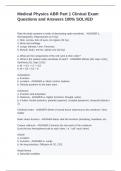Medical Physics ABR Part 1 Clinical Exam
Questions and Answers 100% SOLVED
Rate the body systems in order of decreasing radio-sensitivity. - ANSWER-1.
Hematopoietic, Reproductive (2-5 Gy)
2. Skin, cornea, lens of eyes, GI organs (10 Gy)
3. Bone and cartilage
4. Lungs, kidneys, Liver, Pancreas
5. Muscle, brain, nerves, spinal cord (20 Gy)
a. What are the components of the cell cycle & their order?
b. What is the relative radio-sensitivity of each? - ANSWER-Mitosis (M), Gap 1 (G1),
Synthesis (S), Gap 2 (G2)
a. M -> G1 -> S -> G2
b. M > G2 > G1 > S
Cerebellum:
a. Function
b. Location - ANSWER-a. Motor control, balance
b. Directly posterior to the brain stem.
Cerebrum:
a. Function and properties
b. Divisions - ANSWER-a. Higher functions: thought, action.
b. 4 lobes: frontal (anterior), parietal (superior), occipital (posterior), temporal (lateral x
2).
Cerebral cortex - ANSWER-Sheet of neural tissue outermost to the cerebrum. Grey
matter
Brain steam function - ANSWER-Basic vital life functions (breathing, heartbeat, etc.
Corpus callosum - ANSWER-Connects the two parts of the cerebrum.
{Lets the two hemispheres talk to each other, i.e. "call" each other}
Alveoli
a. Location
b. Function - ANSWER-a. Lungs
b. Air-lung interface. Diffusion of O2, CO2.
Hiatal hernia
a. Describe condition
,b. Imaging modality to diagnose? - ANSWER-a. Part of the stomach sticks upward into
the chest through opening in the diaphragm.
b. UGI x-ray after ingestion of barium.
Upper gastrointestinal. - ANSWER-UGI. Esophagus, stomach, and duodenum
Lower gastrointestinal - ANSWER-LGI. Small and Large intestine. Stool.
US transducers:
a. What is the angle of orientation of the two surfaces?
b. How thick are the transducers in terms of the wavelength?
c. Are the pressure waves and voltage in phase or out of phase? - ANSWER-a. 180
degrees.
b. lambda/2
c. pressure: in phase. Voltage: out of phase.
Stroke
a. Describe
b. Effects - ANSWER-a. sudden loss of consciousness resulting when the rupture or
occlusion of a blood vessel leads to oxygen lack in the brain
b. Loss of brain function, ischemia, hemorrhage
Ischemia - ANSWER-Insufficient blood flow to an area
Hemorrhage - ANSWER-Flow of blood from a ruptured blood vessels.
Transurethral resection - ANSWER-Small pieces of tissue from a nearby structure
(typically prostate) are removed through the wall of the urethra.
Foramen magnum - ANSWER-A large hole in the occipital bone (base of skull) for the
passage of nerves into the spinal cord.
Liver cirrhosis
a. Describe
b. Causes
c. Effects - ANSWER-a. Cells are progressively destroyed and replaced by fatty and
fibrous tissue that surrounds the intrahepatic blood vessels and biliary radicles,
impeding the circulation of blood through the liver.
b. Caused by chronic alcohol abuse (alcoholism); hepatitis B, C, and D (causes liver
inflammation and injury leading to cirrhosis); and ingestion of poisons.
c. Hypertension, intestine bleeding.
Sarcoidosis - ANSWER-Chronic inflammatory disease in which small nodules
(granulomas) develop in lungs, lymph nodes, and other organs
Meiosis
a. Describe
, b. Result - ANSWER-a. Cell division that produces reproductive cells in sexually
reproducing organisms
b. 4 haploid cells
Haploid cells - ANSWER-A cell containing only one set of chromosomes.
Diploid - ANSWER-Cell having two sets of chromosomes or twice the haploid number.
How many essential minerals to human health. List them. - ANSWER-17.
7 major: Calcium, Sodium, Chloride, Magnesium...
Phosphorus, Sulfur, Potassium.
10 trace: Manganese, Chromium, Copper, Selenium...
Zinc, Iodine, Fluoride, Molybdenum.
{Sing Mexican Hat Dance. Iodine = "EyeDine"}
How many and what are the major elements of the body? - ANSWER-4.
H (63%)
O (26%)
C (9%)
N (1%)
Number of Cranial (CNS) nerves - ANSWER-12 types (but are paired, so 24 total)
Oh Once One Takes The Anatomy Final Very Good Vacations Are Here.
What are the thresholds for whole body acute radiation (rem/rad or Sv/Gy) for given
symptoms? - ANSWER-rem <=> rad; Sv <=> Gy
50 rem (0.5 Sv): Blood count change
100 rem (1 Sv): Vomiting
150 rem (1.5 Sv): Death threshold
350 rem (3.5 Sv): LD 50/60 with minimal care
500 (5 Sv): LD 50/60 with supportive medical care
1000 (10 Sv): LD 50/60 with intensive medical care (bone marrow transplant)
*LD 50/60 is the lethal dose at which 50% of those exposed die within 60 days.
At what vertebral level is the Umbilicus? - ANSWER-L3-L4
Liver function - ANSWER-Stores glycogen;
manufactures and secretes bile; manufactures blood proteins;
destroys old red blood cells;
detoxifies harmful substances
Gallbladder function - ANSWER-Store & concentrate bile produced by the liver until it is
needed in the small intestine
Adenoma - ANSWER-A benign epithelial tumor of glandular origin.




